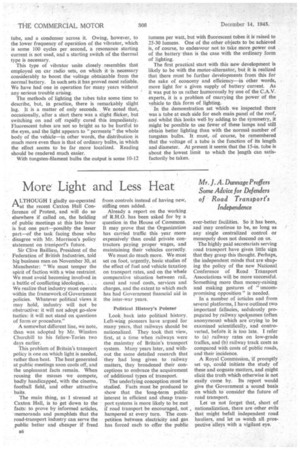More Light and Less Heat
Page 32

If you've noticed an error in this article please click here to report it so we can fix it.
Mr. J,. A. Dunnage Proffers Some Advice for Defenders of Road Transport's Independence A LTHOUGH I gladly co-operated r-'at the recent Caxton Hall Conference of Protest, and will do so elsewhere if called on, the holding of public meetings at this late hour is but one part—possibly the lesser part—of the task facing those who disagree with Mr. Morrison's policy statement on tran4orf's future.
Sir Clive Baillieu, President of the Federation of British Industries, told big business men on November 30, at Manchester: "We must temper the spirit of faction with a wise restraint. We must avoid becoming involved in a battle of conflicting ideologies. . . . We realize that industry must operate within the framework of Government policies. Whatever political views it may hold, industry will hot be obstructive: it will not adopt go-slow tactics: it will not stand on questions of form or procedure."
A somewhat different line, we note, than was adopted by Mr. Winston Churchill to his fellow-Tories two days earlier.
This problem of Britain'S transport policy is one on which light is needed, rather than heat. The heat generated at public meetings soon cools off, and ihe unpleasant facts remain. When rousing the masses we compete, badly handicapped, with the cinema, football field, and other attractive baits.
The main thing, as I stressed at Caxton Hall, is to get down to the facts: to prove by informed articles, memoranda and pamphlets that the road-transport industry can serve the public better and cheaper if freed from controls instead of having new, stifling ones added.
Already a report on the working of R.H.O. has been asked for by a question in the House of Commons. It may prove that the Organization has carried traffic this year more expensively than could private contractors paying proper wages, and maintaining their vehicles correctly.
We must do much more. We must set on foot, urgently, basic studies of the effect of fuel and vehicle taxation on transport rates, and on the whele comparative situation between rail, canal and road costs, services and charges, and the extent to which each has had Government financial aid in the inter-war years.
Political History's Pointer Look., back into political history. Left-wing pioneers have argued for many years, that railways should be nationalized. They took that view, first, at a time when railways were the mainstay of Britain's transport system. Many years later, and without the same detailed research that they had long given to railway matters, they broadened their conceptions to embrace the acquirement of additional types of transport.
The underlying conception must be studied. Facts must be produced to show that the long-term public interest in efficient and cheap transport systems is more likely to be met if road transport be encouraged, not hampered at every turn. The competition between electricity and gas has forced each to offer the public ever-better facilities. So it has been, and may continue to be, so long as any single centralized control or monopoly does not descend on us.
The highly paid secretariats serving toad transport have given little sign that they grasp this thought. Perhaps, the independent minds that are shaping the policy of the new National Conference of Road Transport Associations will be more successful. Something more than money-raising and making gestures of "uncompromising opposition" is needed.
In a number of articles and from several platforms, I have outlined two important fallacies, sedulously propagated by railway spokesmen (often anonymous) which are crying to be examined scientifically, and controverted, before it is too late. I refer to (a) railway rates on low-grade traffics, and (b) railway track costs as compared with costs of public roads, and their incidence.
A Royal Commission, if promptly set up, could initiate the study of these and cognate matters, and might elicit the truth whiCh otherwise is not easily come by. Its report would give the Government a sound basis on which to considet the future of road transport.
Let us not forget that, short of , nationalization, there are other evils that might befall independent road hauliers, and let us watch all pros pective 'alleys with a vigilant eye. •




























































